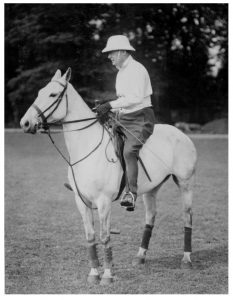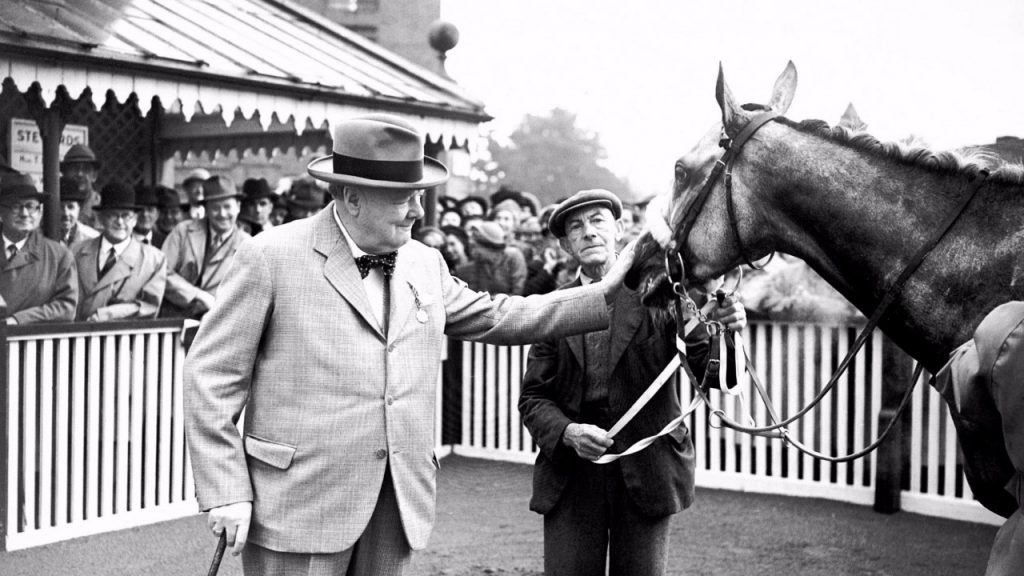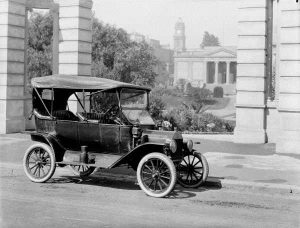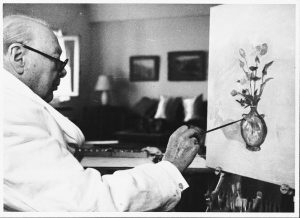
Frequently Asked Questions
Personal Life

August 30, 2021
Q. Did Sir Alexander Fleming save Churchill’s life?
A. No. The Churchill-Fleming Non-Connection goes like this. The story that Sir Alexander Fleming or his father (the renditions vary) saved Churchill’s life has been roaring around the Internet for a long while now. We get frequent emails asking about this story. Charming as it is, it is certainly fiction. The story apparently originated in Worship Programs for Juniors, by Alice A. Bays and Elizabeth Jones Oakbery, published ca. 1950 by an American religious house, in a chapter entitled The Power of Kindness.
According to Bays/Oakbery, Churchill is saved from drowning in a Scottish lake by a farm boy named Alex. A few years later Churchill telephones Alex to say that his parents, in gratitude, will sponsor Alex’s otherwise unaffordable medical school education. Alex graduates with honours and in 1928 discovers that certain bacteria cannot grow in certain vegetable molds. In 1943 when Churchill becomes ill in the Near East, Alex’s invention, penicillin, is flown out to effect his cure. Thus once again Alexander Fleming saves the life of Winston Churchill.
Dr. John Mather writes: “A fundamental problem with the story is that Churchill was treated for this very serious strain of pneumonia not with penicillin but with ‘M&B,’ a short name for sulfadiazine produced by May and Baker Pharmaceuticals. Since he was so ill, it was probably a bacterial rather than a viral infection as the M&B was successful.
“Kay Halle, in her charming book Irrepressible Churchill (Cleveland: World 1966) comments (p. 196) that Churchill ‘delighted in referring to his doctors, Lord Moran and Dr. Bedford, as M&B.’ Then, when Churchill found that the most agreeable way of taking the drug was with whisky or brandy, he commented to his nurse: ‘Dear nurse, pray remember that man cannot live by M and B alone.’ But there is no evidence in the record that he received penicillin for any of his wartime pneumonia. He did have infections in later life, and I suspect he was given penicillin or some other antibiotic that would have by then become available, such as ampicillin. Also, Churchill did consult with Sir Alexander Fleming on 27 June 1946 about a staphylococcal infection which had apparently resisted penicillin. See Churchill: Taken from the Diaries of Lord Moran (Boston: Houghton Muffin 1966), p. 335.”

2024 International Churchill Conference
Official biographer Sir Martin Gilbert adds that the ages of Churchill and Fleming (or Fleming’s father) do not support the various accounts circulated; Alexander Fleming was seven years younger than Churchill. If he was plowing a field at say age 13, Churchill would have been 20. There is no record of Churchill nearly drowning in Scotland at that or any other age; or of Lord Randolph paying for Alexander Fleming’s education. Sir Martin also notes that Lord Moran’s diaries, while mentioning “M&B,” say nothing about penicillin, or the need to fly it out to Churchill in the Near East.
Q. Where are the residences of Churchill in England?
A. You can find the complete list in an article that was printed in Finest Hour 138 here. Official residences such as Admiralty House and Downing Street are are listed only for the periods the Churchills actually resided there. Several addresses carry the blue historical plaque. Also, see our Residences section for more on this topic.
Q. Graham Taylor writes: “I should probably know the answer to this one, but what did Churchill find so fascinating about Napoleon? He didn’t relegate him to the ‘power-mad dictator’ heap, so there must be something he found attractive.’
A. Surely it was his reverence for France, and for great war leaders (he wrote cogently about Caesar and Marlborough) that led Churchill to Napoleon, not to mention that the Corsican made quite an impressive comeback — like WSC. Remember that as early as Harrow, he forecast to a schoolmate that he would lead the defense of London against a deadly foe. He also intended to write a Napoleon biography, but never found the time. From the editor’s next book, The Churchill Lexicon:”I certainly deprecate any comparison between Herr Hitler and Napoleon; I do not wish to insult the dead.”-Commons, December 1940
“Is it really true that a seven-mile cross-country run is enforced upon all in this division, from generals to privates? Does the Army Council think this a good idea? It looks to me rather excessive. A colonel or general ought not to exhaust himself in trying to compete with young boys running across country seven miles at a time. The duty of officers is no doubt to keep themselves fit, but still more to think for their men, and to take decisions affecting their safety or comfort….Could Napoleon have run seven miles across country at Austerlitz? Perhaps it was the other fellow he made run. In my experience based on many years’ observation, officers with high athletic qualifications are not usually successful in the higher ranks.”-Minute to Sec. of State for War Capt. H.D.R. Margesson, 4Feb41, The Grand Alliance(1950), p. 175.
“Some have compared Hitler’s conquests with those of Napoleon. It may be that Spain and Russia will shortly furnish new chapters to that theme. It must be remembered, however, that Napoleon’s armies carried with them the fierce, liberating and equalitarian winds of the French Revolution, whereas Hitler’s empire has nothing behind it but racial self-assertion, espionage, pillage, corruption and the Prussian boot.”-Commons, 7 May 1941
“I always hate to compare Napoleon with Hitler, as it seems an insult to the great Emperor and warrior to connect him in any way with a squalid caucus boss and butcher.”-Commons, 28 Sep. 1944
Q. Why was Churchill given the Nobel Prize for Literature for his work as a writer and speaker in 1953?
A. By John Plumpton, Toronto, Ontario. In a publication of the Nobel Prize Library, published under the Sponsorship of the Nobel Foundation and the Swedish Academy, Kjell Stromberg tells the story of the 1953 award.
Usually government leaders were not honoured, but Churchill had already been considered twice. Support for him had come from around the world, particularly from within Sweden. In 1946 a report found that Savrola was without literary merit, My Early Life was charming, but only Marlborough rough could serve as a basis for winning. The World Crisis was dismissed as history and historians did not win (only Theodor Mommsen was a previous winner).
In 1948 another report committee consulted G.M. Trevelyan who, despite their disagreements over Macaulay, endorsed Churchill. The World Crisis carried great weight this time because in no other work could “the true pulse of the age be sensed so well or the direct breath of the great events be felt so clearly.”
This report called Churchill “the incomparable painter of the history of our time.” Nevertheless, it was felt that the orator, without peer in his century, was needed to reinforce the written work. “It is, then, basically for his oratory that Churchill deserves the Prize; but his art as an orator is well framed by the rest of his production,” said the report.
In spite of this extremely favourable report, the Academy eventually waited another five years before yielding to the appeals which came with ever greater urgency from all corners of the globe. The fact that he was still an active politician was probably influential in their reluctance to make the final decision.
Competition was not particularly fierce in 1953. The Swedish Pen Club supported E.M. Forster. Others, including Ernest Hemingway, were to win in subsequent years. On October 15th, the Prize was voted to Churchill “for his mastery of historical and biographical description as well as for brilliant oratory in defending exalted human values.”
Winners are seldom consulted but this time the Swedish Ambassador asked Churchill if he would accept. He replied that he was honoured, particularly because of the recognition of his written works. He was required to be in Bermuda to meet with President Eisenhower so his wife, Lady Churchill, and his daughter, now Lady Soames, represented him.
Q. What horses did Churchill own?
A. We asked Katharine Thomson (“Churchill and the Lure of the Turf” Finest Hour 102) if she could list all the racehorses Churchill ever owned. The chore was far more formidable than we would ever have imagined. Undaunted, Katharine gave us even more than we asked for.
All the Thoroughbreds Sir Winston Ever Owned by Katharine Thomson, Churchill Archives Centre
Brood Mares
Cedilla: bred 1951, sold 1962.
Comma: by Chamoissaire out of Cedilla, 1958; sold 1962.
Madonna: bred 1945.
Moll Flanders: bought 1949.
Pannikin II: bought 1948.
Pink Lady
Poetic: bought 1949.
Salka: bred 1950.
Sayala: bred 1951.
Sister Sarah: died 1955.
Turkish Blood: bred 1944, died 1961.
The Veil: by Abernant out of Sister Sarah, 1953.
Racehorses
Aberdilla: by Abernant out of Cedilla, 1961.
Alba: by Abernant out of Salka, 1959; sold to stud in United States.
Aura: by Aureole out of Cedilla, 1956; sold 1959.
Collusion: by Colonist out of Moll Flanders, 1955; won 1956.
Colonist II: by Rienzo out of Cybele, 1946; bought as three-year-old in France, 1949. Won 13 races, including Winston Churchill Stakes, Bentinck Stakes and Kensington Palace Stakes and £11,937 in prize money. Sold to stud 1951 for £7,350.
Canyon Kid: bred 1948; won Speedy Stakes. Died 1950 or 1951.
Dark Issue: trained in Ireland; won Irish 1000 Guineas 1955.
First Light: bred 1953.
Galaxy: by Galcador out of Salka, 1956; sold 1958.
Gibraltar III: bred 1950; won twice 1952-53.
Great Winter (I suspect this should be Red Winter): trained in Ireland.
Halo: by Hyperion out of Madonna, 1956; won in 1959 and retired to stud at Newchapel as a brood mare.
High Hat: by Hyperion, out of Madonna, 1957; won four races, including Aly Khan Gold Cup and Winston Churchill Stakes, 4th in Prix de l’Arc de Triomphe. Syndicated to stud in Ireland and sold to Japan 1971.
Holiday Time: bred 1955; won three times as two-year-old.
Honeycomb: by Honeyway out of Madonna, 1961.
Kemal: by Never Say Die out of Turkish Blood, 1959; half brother to Vienna, won over hurdles and on the flat. Retired to stud in Denmark.
Loving Cup: by Holywell out of Pannikin II, 1949; won in 1952 and retired to stud at Newchapel as brood mare.
Lupina: by High Lupus out of Salka, 1961.
The Minstrel: by Abernant out of The Veil, 1960.
Non Stop: bred 1949; won twice 1952-53.
Novitiate: by Fair Trial out of The Veil, 1959: won as 2-year-old.
Pigeon Vole: by Fastnet out of Colombe Poignard~e, 1950; bought in France 1953, won Robert Wilmot Stakes, Windsor.
Pinnacle: bred 1953; won 1955.
Planter’s Punch: by Colonist out of Loving Cup, 1955; sold 1958.
Pol Roger: by Rienzo out of Coquetterie, 1949; won three times, 1952-53.
Le Pretendant: by Ocean Swell out of Cybele, 1953; half brother to Colonist. Won Winston Churchill Stakes, ran in Washington International. Retired to stud in Pakistan.
Prince Arthur: by King Legend out of Poetic, 1950; won three times 1952-54, including Winston Churchill Stakes.
Punctuation: bred 1956.
Release: by Court Martial out of Salka, 1957; won Ebbisham Stakes (£3,500) in 1960, second in Queen Elizabeth II Stakes, won twice 1961, retired as brood mare at Newchapel.
Satrap
Seraph: out of Sayala, 1957: won as 2-year-old and in Maypole Handicap following year. Retired as brood mare at New-chapel.
Sunhat: by Honeyway out of Madonna, 1960.
Sunstroke: by Hyperion out of Moll Flanders, 1955; won twice, sold to Spain for £2000, 1958.
Tudor Monarch: out of Madonna by Abernant, 1955; won two races worth £3,082, including Stewards Cup at Goodwood. Sold to stud in Queensland, Australia, for £1,520 in 1959 (named best-looking stallion in the state, 1963-64).
Vienna: by Aureole out of Turkish Blood, 1957; won twice 1960, three times, 1961; won Prix Ganay at Longchamps (£10,000). Retired to stud in Ireland.
Welsh Abbot: out of Sister Sarah by Abernant, 1955; won twice, the Challenge Stakes and Portland
Handicap, total of £6,882. Syndicated to stud in England for £20,000, 1959; successful sire of sprinters.
Welsh Monk: by Abernant out of The Veil, 1958; won at Newmarket.
Why Tell
The author welcomes addenda and corrigenda.
Q. What do the letters KG, PC, OM, CH, FRS after the name of Sir Winston Churchill represent?
A. They are his chief honours in order of precedence: Knight of the Order of the Garter (KG), 1953; Privy Councillor (PC), 1907; Order of Merit (OM), 1946; Companion of Honour (CH), 1922; and Fellow of the Royal Society (FRS), 1941.
Q. I have been doing research on the name of Winston’s dogs and have not come up with any information at all. I would appreciate any help that you can provide. The years in question would be 1939 to 1946.
A. There were two poodles named Rufus and Rufus II. I’m not sure when Rufus arrived but I think it was in this period. Rufus was run over and killed while Churchill was attending the Conservative party Conference at Brighton in October 1947. Rufus was presented to Churchill by his sometime Private Secretary, Jock Colville. Rufus was brownish red and also responded to a nickname. Ronald Golding, a Scotland Yard bodyguard in 1946, testifies to having heard the command, “Come Paprika, Let Us Go Forward Together” on more than one occasion. Rufus II, his replacement received later in life, was the gift of Walter Graebner, Churchill’s Life Magazine editor for the war memoirs. There is a famous picture of Churchill and Rufus II at Chartwell on page 1092 in the official biography, Vol. 8 Never Despair by Sir Martin Gilbert (London, Boston, Toronto: 1988). There is rumor of a bulldog kept when he was a boy at Harrow, but this sounds almost too cute; have not seen any references.
Q. I have read variously that Winston Churchill suffered from dyslexia and that he stuttered. Which of these is true?
A. Neither. Winston Churchill was not dyslexic, had no learning disability whatsoever. In his autobiography he played up his low grades at Harrow, undoubtedly to convince readers, and possibly himself, how much he had overcome; but in this he exaggerated. He was actually quite good at subjects he enjoyed and in fact won several school prizes. The best source on his actual school performance is Jim Golland’s Not William–Just Winston (Harrow: 1988), still available from the Harrow School Bookshop.
The disability he did suffer from was a lisp (not a stutter, as some believe). He was unable to pronounce the letter “S.” He fought to overcome this but never quite succeeded; instead he gradually made it a distinctive part of his oratory, turning a liability to an asset. This is certainly something young people should find motivating, but it is inaccurate to suggest that he overcame dyslexia or stuttering. His speeches sometimes contained a stutter or two, but this was more intentional than unintentional.
Q. We are looking into creating a menu in honour of Churchill and were trying to find information on his food preferences. The information on cigars, and spirits on Churchill FAQ page was quite useful. Where might one find similar information about food and menus? Any help would be much appreciated. – Jason Clevenger
A. Dear Mr. Clevenger,
I am replying to the Churchill Listserv, some readers of which might be able to help you. If you are not a member of the Churchill Society/Churchill Center, send me your postal address and I will send you a copy of our journal and other information. The latter will shortly be adding a department on his favorite recipes, written with the help of his daughter Lady Soames.
The best source on Churchill’s favorite foods is Georgina Landemare’s RECIPES FROM NO. 10 (London: Collins 1958, reprinted 1959). She was the Churchill family cook and accompanied them to Downing Street. The book is scarce but may be obtainable from a large library or inter-library loan.
In brief, he was a fan of French Haut cuisine. He was also partial to English traditional dishes like fowl, and roast beef with Yorkshire pudding. He preferred clear, “limpid” soups to thick, creamy ones. He enjoyed shellfish more than fish and Stilton more than sweet desserts, but he could easily be persuaded to take both of the latter. In dinners we have arranged at the Savoy Hotel in his memory, we have served menus he would have particularly enjoyed: raw oysters, Petite Marmite, Beef & Yorkshire, dessert (pudding) and Stilton. Indeed the Savoy still has people on its staff who cooked for him and could help you considerably.
He insisted that desserts be expressive. It is probably true, though not attributed, that he once demanded, “Take away this pudding, it has no theme.”It is established that in 1915 he wrote his brother Jack from Hoe Farm, where he was spending the summer, that he had all the necessities of life:”Hot baths, cold Champagne, new peas and old brandy.” This ought to get you going.
Editor Finest Hour
Q. What commercial cigars and spirits did Sir Winston prefer? Asked by Maj Gen Kenneth Perkins (husband of Churchill granddaughter Celia Sandys) on her behalf.
A. Cigars: Many were specially made up for him, bearing his name on the wrapper with no brand indicated. But his favourite commercial brands were Camacho and Romeo y Julieta, both Havanas. William F. Buckley, Jr., wrote that the Dunhill’s he received from The International Churchill Society were Churchill’s favourites, earning an immediate e-mail riposte that the man from Dunhill was smoking something, likely not tobacco.
Scotch: Johnny Walker Red. Churchill was a personal friend of Sir Alexander Walker, judging by a fine jacketed copy of Into Battle inscribed to Walker, which we have just seen for sale. He apparently did not have much time for single malts.
Brandy: Vintage Hine. An early issue of Finest Hour recalls that a London wine merchant, sent to appraise the cellar at Chartwell, pronounced it a “shambles,” the only items of value being a large supply of vintage Pol Roger Champagne, which was regularly topped up by shipments from Madame Odette Pol-Roger in Epernay; the Hine brandy; and some bottles of chardonnay which Churchill had bottled with Hillaire Belloc and which WSC forbade anyone to touch. The merchant pronounced the chardonnay undrinkable, along with the rest of the cellar!
Finest Hour’s editor asked General Perkins why Celia needed this cigar information. “Well, they’re not for me, I don’t smoke,” he said. I replied, “In that case obviously they are for me, please tell her to strip them of their Cuban bands and send them in a plain brown wrapper.”
Q: I realize the Churchill quote, “I never did any sports,” is a fake, but what is its source, Nazi propaganda?
A: It is almost certainly a fake, since it is flatly untrue. He played golf, indifferently, in his 30s and 40s. He rode to hounds until well into his 70s. He swam into his 80s. He played polo into his 50s. See by Barbara Langworth’a article for Finest Hour 72, Churchill and Polo. It may arise from his famous crack that he got his exercise by serving as pall-bearer for his many friends who exercised all their lives, another false thread. He had, and exhibited, prodigious energy.
Subscribe
WANT MORE?
Get the Churchill Bulletin delivered to your inbox once a month.




